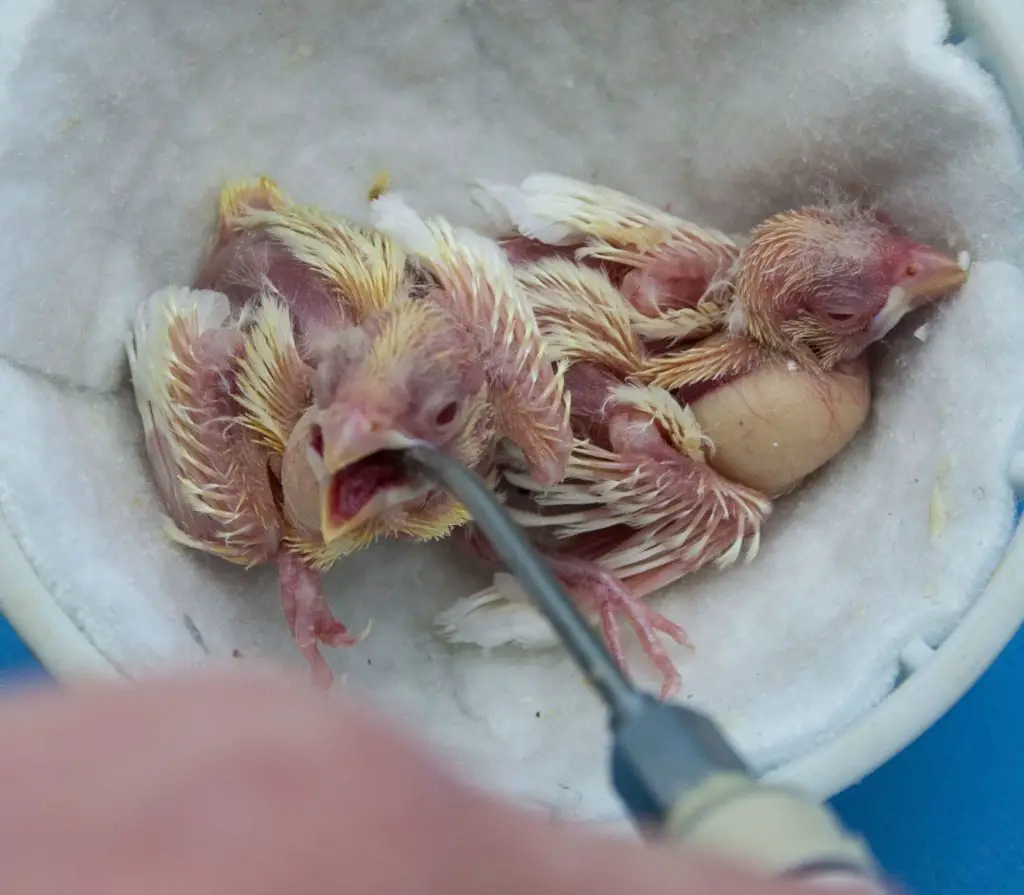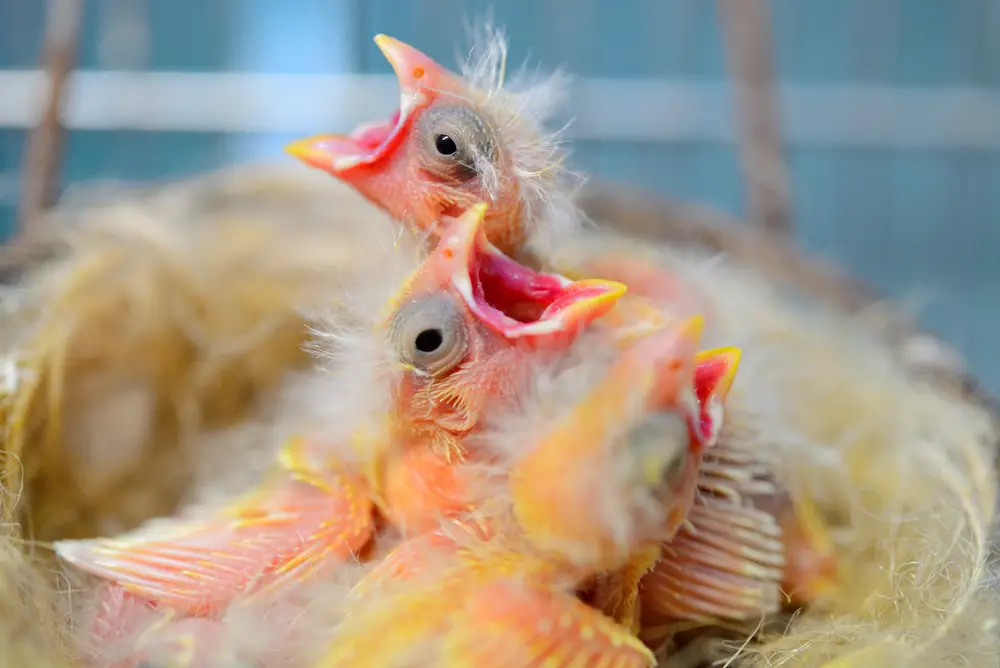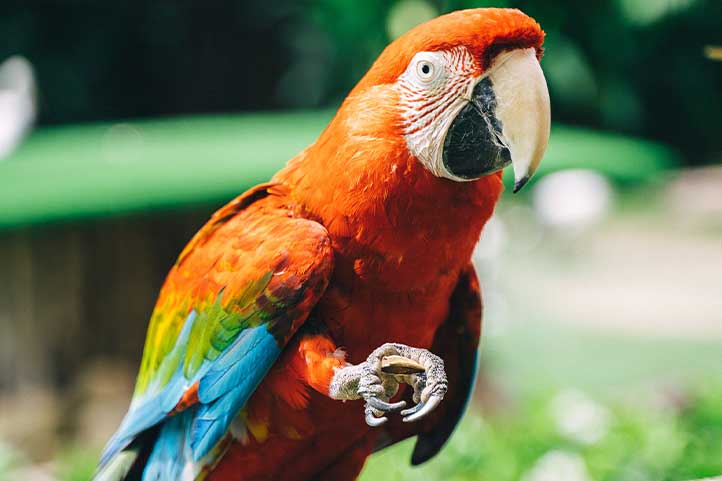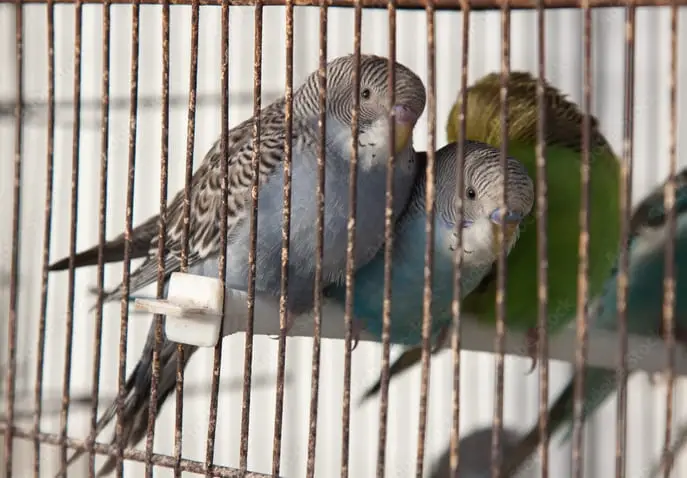Translated by Nick R
Canaries don’t require many things from their owners but only some basic care to maintain their well-being. Baby canaries, however, do need a little more to survive, and here I show you what you can feed them.
Table of Contents
About canaries and chicks
Reproduction in canaries
Canaries are a species within the order Passeriformes and the family Fringillidae, endemic to the Canary Islands. They are very active and small songbirds that like to sing melodies. They are excellent pets thanks to their long domestication, which led to the emergence of a domestic subspecies: Serinus canaria domestica.
In the wild, the reproduction of canaries is seasonal; they mate when the day lasts 12 hours or during the spring equinox, preparing for the last days of winter when both the male and the female present physical and behavioral changes. On the one hand, the female exhibits swelling in her belly, which becomes a little rounder. On the other hand, the male is more restless and sings louder than normal.
These birds begin to breed between 6 and 7 months of age when they reach sexual maturity. The male performs a courtship ritual consisting of dancing and singing to conquer the female, who will show her readiness for mating by receiving food from beak to beak. From this moment on, and after 7 days of mating, the female begins to oviposit almost one egg per day, laying an average of 3 to 5 eggs in total; an effort that requires special feeding.
Growth stages of a canary
Chick
Canaries from day 1 to day 26 (sometimes up to a month old) are considered chicks, as they are completely dependent on their parents. Chicks should be fed exclusively on baby food (baby birds) and remain in the nest for this period during which they are still helpless.
From day 10 or 11, still a chick, the baby canary begins to develop its feathers. Feathers are fundamental in birds and the total growth of feathers is an indication of the maturity of the chick.
From days 18 to 21 (3 weeks), the chick will be able to leave the nest and start to become a young bird, something that won’t happen for another month or more after hatching.
Youth
At approximately 26 to 30 days (4 weeks), the chicks are able to eat on their own and will begin to nibble on birdseed, some may take a little longer. However, a little after the fifth week they are independent young birds that will feed and explore the world on their own, therefore they will need a cage of their own.
Adulthood
Canaries reach adulthood at 6 months of age when they are ready to reproduce and must find mates to give birth to their first brood.
How to feed canaries during the breeding season?
Before going on to the care of the offspring, don’t forget that the parents must always have food and fresh water available; mom’s and dad’s work is hard. The parents will ensure the development of the chicks and for this reason, they must be fed a much more nutritious mixture than the common birdseed: the brood paste. This paste provides extra energy and protein to both father and mother to fulfill their goal of bringing healthy canaries into the world.
But how do I get this paste?
You can make the paste yourself at home and only need the following ingredients:
- Toasted bread or crackers (without sugar).
- Egg.
- Eggshell.
- Fruits and vegetables.
- Two containers.
- Grinder (optional).
How to prepare breeding paste for canaries?
- Prepare the base of the paste, crushing toasted bread or crackers in the grinder.
- Boil an egg and keep the shell.
- Add the egg and shell to the masher.
- Add fruits and vegetables such as apples, carrots, or broccoli to the masher to add a little moisture to the mixture.
- Mash until a uniform and fine mixture is created.
Now you’re done…
How to take care of baby canaries?
The care of canaries is very simple, but you must consider the following tips when deciding to adopt and raise a canary from the baby. To offer the chicks a good life, keep in mind these three fundamental aspects:
The ideal environment for baby canaries
To maintain your chicks’ well-being, provide them with a quiet environment, away from dangers and with proper temperature (no lower than 35°C). Avoid drafts and excess humidity. Remember that the lower the temperature, the slower the chicks will develop.
The cage must have a minimum space of 50 cm long, which must have all the regulatory accessories such as feeders, drinkers and perches. But, also and much more important, it must have two nests in the form of a bowl.
In addition, once the chicks become young canaries, you must have a separate cage ready.
Raising canaries
Before hatching, the chicks have an incubation time of 12 to 16 days, a time in which the female will perch on the eggs to keep them as warm as possible. Raising baby canaries is a full-time task for their parents, who must be 100% attentive to their chicks until they reach a certain maturity and become self-sufficient canaries.
Canaries normally take care of one brood and once the chicks are on their own, the parents almost immediately assume responsibility for a new brood. Therefore, to ensure the welfare of the two clutches and optimal development of the new family members, especially if you are in tropical areas, you must set their environment to induce reproduction under the necessary conditions in which these birds activate their instinct and prepare for mating.
Recommendations
Although raising chicks in captivity is a little more complex, because they are enclosed and do not perceive sunlight or environmental changes optimally, you as the owner can promote the breeding season.
- Change of season. Sunlight or artificial light for 12 hours a day, increasing it gradually 15 minutes per day and for a week, starting with 10 hours. The temperature increase must go hand in hand with the light increase. Remember this!
- Artificial eggs. You must change the real eggs for artificial ones as the female lays them. Then, when she has laid all the eggs, put the real eggs back in. This is so that all the chicks hatch at the same time.
- Nests. Keep two nests inside the mating cage given their natural behavior of laying two consecutive clutches.
Feeding
Canaries are granivorous birds, that is, they like to eat seeds. This is very important because it will determine the type of food you should feed your baby bird. Some birds are insectivorous (they eat insects) and feeding them prefabricated food is not recommended. Baby canaries eat mush, which makes them like other species such as the cockatiel.
Canaries will be able to eat on their own after about 30 days, so you must take care of their feeding until then together with their parents. Be very careful and don’t rush to separate the chicks from their parents too soon because you could have disastrous consequences, do it gradually and until they are 5 or 6 weeks old.
How to feed baby canaries?
The feeding of newly hatched canaries has to be handled naturally by the parents, who, in addition, must ensure the care of the little ones. In captivity, this changes a bit, because you are in charge of their parents, which automatically makes you responsible for the chicks as well.
So, if you decided to raise the canaries from hatching, you need pap to feed them, a putty with the necessary nutrients and easy to digest. The food newborn canaries need must have a high content of protein and calcium, the most important nutrients for their growth.
Where do I get it? What alternatives do I have to feed the helpless chicks?
1. Buy baby canary food
One of the options to feed your baby canary is to buy baby canary food in a specialized bird food store, which will cost you an average of 5 to 10 dollars per 1 kg. The porridge you buy at the bird store contains basically: Cereals, Proteins, Vegetables, Yeast, Egg yolk, Vegetable by-products (Flour), Minerals, and Sugars; everything necessary for the little ones.
2. Preparing baby canary food
The other option recommended for feeding your baby canary is to make the food yourself. To prepare homemade baby food easily, you only need a few elements and ingredients that you have on hand at home, which will supply your newborn with proteins, minerals (calcium), fat, fiber and vitamins. Below, I show you how, read on.
Step by step to prepare food for baby canaries

What do you need to prepare baby canary food?
To create baby canary porridge you need to get these elements and ingredients, with which you will create a tasty delicacy to provide all the necessary nutrients at this stage of the life of your new friends and their parents.
Ingredients
Ground oatmeal or flour (base).
Egg (base).
- Eggshell.
- Water.
- Bread yeast.
- Garlic (optional).
- Cookie or bread (optional).
Utensils
- Containers
- A stick, syringe, or dessert spoon.
- Strainer.
- Grater or grinder (optional).
How to prepare baby canary food?
If you definitely chose to prepare the best homemade baby food, follow the instructions, and voila!
Step1: get ready
The first step in the preparation of baby food is to prepare the utensils and ingredients mentioned above. If you don’t get everything ready before preparing, you’re going to mess it up and take more time than necessary.
- Put everything on the table in an organized way.
- Boil an egg until it is hard or cooked (first base). It will be a fundamental part of the porridge because of its high protein and fat content.
- Keep the shell of the boiled egg, rich in calcium.
Step 2: Preparation
The second step is preparing the porridge, which is mainly composed of grain and water. There are several ways to prepare the baby canary porridge, but it will depend on how easy it is to find the ingredients.
- Prepare the base of the porridge, rich in protein and fiber. Introduce the ground oatmeal or flour in the container (previously strained).
- Grate the hard-boiled egg, and then, introduce it in the bowl with the oatmeal.
- Crush the eggshell and add it to the bowl.
- Add brewer’s yeast which serves as a source of protein and for digestion.
- Add garlic powder, it helps for good digestion and bacterial flora.
- Add cracker or bread crumbs to give it consistency.
- Pour warm water little by little.
Finally, mix all the ingredients with the water until you get a fine and uniform texture.
Recommendations
- If you do not have all the ingredients, you can make your porridge only with the bases and water.
- The mixture should contain enough moisture to be digested easily by the chicks, so remember to add enough water without exceeding it. The porridge should be viscous, not liquid.
- Avoid preparing too much, just what the chick(s) will eat at the moment, to prevent it from spoiling. You can store it in the refrigerator, but I don’t recommend keeping it for more than 1 day refrigerated.
- Avoid leaving lumps or pieces that may affect the digestion of the chick.
- It is advisable to add the eggshell only once a week.
Step 3: Feed
Once you have the mixture ready, feed the chicks carefully. Use a toothpick, syringe or spoon to introduce the food into its mouth and gently touch its beak when it does not open it so that it continues to eat.
Watch out for the crop!
Before feeding, check the condition of the chick’s crop, because if the crop is full or swollen, you must not feed it; the bird will simply not receive the food. On the other hand, if you notice that the crop is flaccid and empty, the bird will ask you to feed it.
Baby canaries, as well as other birds, have a very fast appetite and metabolism, so you will have to feed it several times during the day. This will guarantee an optimal development of the animal, even if it doesn’t ask for food, you should check it and detect if it is lacking its food. As you feed the chick you’ll notice that its feeding habits will change.
Double the portion
Note that between 15 and 20 days, when baby canaries begin to leave the nest, you’ll need to increase the amount of food, as they increase in size and activity. At this age, they’ll naturally demand twice what they eat.
Feeding your pet birds is extremely important. Ensuring a good diet for your friends from a young age is the best way to show them your love. Feed your canaries from chicks!
You may also be interested in
How to take care of baby birds?
Feeding a pet bird


